
I like to keep it active. You know- critical thinking, reading, etc.
The LA Times just completed a wonderful 4-part series on how learning and memory work. The NYT re-emphasized the importance of physical exercise for neurogenesis (the creation of new neurons). To put this news in better perspective, let's review some good lifestyle options we can follow to maintain, and improve, our vibrant brains.
1. Learn what is the "It" in "Use It or Lose It". A basic understanding will serve you well to appreciate your brain's beauty as a living and constantly-developing dense forest with billions of neurons and synapses.
2.Practice positive, future-oriented thoughts until they become your default mindset and you look forward to every new day in a constructive way. Stress and anxiety, no matter whether induced by external events or by your own thoughts, actually kills neurons and prevent the creation of new ones. You can think of chronic stress as the opposite of exercise: it prevents the creation of new neurons.
3. Thrive on Learning and Mental Challenges. The point of having a brain is precisely to learn and to adapt to challenging new environments. Once new neurons appear in your brain, where they stay in your brain and how long they survive depends on how you use them. "Use It or Lose It" does not mean "do crossword puzzle number 1,234,567". It means, "challenge your brain often with fundamentally new activities".
We are (as far as we know) the only self-directed organisms in this planet. Aim high. Once you graduate from college, keep learning. The brain keeps developing, no matter your age, and it reflects what you do with it.
4.Explore, travel. Adapting to new locations forces you to pay more attention to your environment. Make new decisions, use your brain.
5.Don't Outsource Your Brain. Not to media personalities, not to politicians, not to your smart neighbour... Make your own decisions, and mistakes. And learn from them. That way, you are training your brain, not your neighbour's.
6.Develop and maintain stimulating friendships. We are "social animals", and need social interaction. Which, by the way, is why 'Baby Einstein' has been shown not to be the panacea for children development.
7.Laugh. Often. Especially to cognitively complex humor, full of twists and surprises. Better, try to become the next Jon Stewart
8. Don't expect advice to come in tens. Ok?






No comments:
Post a Comment